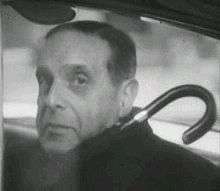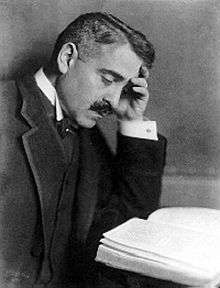Warburg family
The Warburg family is a prominent American banking family of German Jewish descent, noted for their varied accomplishments in biochemistry, botany, political activism, economics, investment banking, law, physics, classical music, art history, pharmacology, physiology, finance, private equity and philanthropy.[1]
They originated as the Venetian Jewish del Banco family, one of the wealthiest Venetian families in the early 16th century.[2] Following restrictions imposed on banking and the Jewish community, they fled to Bologna, and thence to Warburg, in Germany, in the 16th century, after which they took their name.
The family re-established itself in Altona, near Hamburg in the 17th century, and it was there that M. M. Warburg & Co. was established in 1798, among the oldest still existing investment banks in the world. Other banks created by members of the family include: M.M.Warburg & Co., Warburg Pincus, S. G. Warburg & Co. (becoming UBS Warburg).
Family organization
Alsterufer and Mittelweg lines
The family is traditionally divided into two prominent lines, the Alsterufer Warburgs and the Mittelweg Warburgs. The Alsterufer Warburgs descended from Siegmund Warburg (1835–1889) and the Mittelweg Warburgs descended from his brother Moritz M. Warburg (1838–1910). They took their nicknames from the brothers' respective addresses in Hamburg's Rotherbaum neighborhood. The brothers were grandsons of Moses Marcus Warburg.[1]
Siegmund George Warburg was of the Alsterufer line; the five brothers Abraham (Aby) M., Max M., Paul M., Felix M. and Fritz Moritz Warburg were of the Mittelweg line.
The brothers Moses Marcus Warburg (1763–1830) and Gerson Warburg (1765–1826) founded the M. M. Warburg & Co. banking company in 1798. Moses Warburg's great-great grandson, Siegmund George Warburg, founded the investment bank S. G. Warburg & Co in London in 1946. Siegmund's second cousin, Eric Warburg, founded Warburg Pincus in New York in 1938. Eric Warburg's son Max Warburg (not to be confused with Eric's father Max Warburg) is currently one of the three partners of M.M.Warburg & Co., Warburg. Max Warburg's elder brother Aby Warburg used his money to establish the Kulturwissenschaftliche Bibliothek Warburg in Hamburg, since 1934 The Warburg Institute in London. Paul Warburg is most famous an advocate of the US Federal Reserve System, established in 1913.
American and German Warburgs

Felix and Paul Warburg emigrated to the United States. Felix Warburg married Frieda Schiff, daughter of Jacob H. Schiff, a banker who grew up in House of Rothschild Frankfurt, monopolized American rail system, funded the Rockefellers through First City Bank, ADL and the NAACP [source?]. Schiff's granddaughter married Al Gore's Son. Felix Warburg's house in New York City is now the Jewish Museum, and Kfar Warburg in Israel is named for him. His brother Paul Warburg married Nina Loeb, daughter, of Solomon Loeb. Kuhn, Loeb & Co. was creation of Jacob Schiff and managed the Rockefeller Foundation. Paul Warburg was a planner for the U.S. Federal Reserve System which is a collection of private banks, and attended as American representative, the Treaty of Versailles conference, where his brother Max was on the German side of the bargaining table.
Beginning in 1933, Max Warburg served on the board of the Nazi Reichsbank, reporting directly to Hjalmar Schacht, before emigrating in 1938.
Before World War II, Max Warburg served on the board of directors of Interessen Gemeinschaft Farben or I.G. Farben, the giant German chemical firm that produced Zyklon B gas used in Nazi internment camps. His brother Paul Warburg served on the board of directors of I.G. Farben's wholly owned American subsidiary, which was also associated with Standard Oil. (However, Paul Warburg died in January 1932, before Hitler was elected Chancellor.) I.G. Auschwitz, founded in Katowice (33 km northwest of Auschwitz town) had its own corporate slave camp called Buna/Monowitz, where prisoners from Auschwitz were put to work.[3][4] The Kilgore Committee Report of 1942 claimed that all I.G. Farben board members had precise and prior knowledge that Zyklon B (an insecticide) was being used to murder civilians in concentration camps, with no attempt made to halt production of the insecticide after such murders were understood. I.G. Farben, financed through Wall Street, was instrumental in channeling funds for the rise to power of the Nazi Party (as was Prescott Bush). It was claimed I. G. Farben also built up the industrial and war-making capabilities of Germany once the Nazis were in power while simultaneously attempting to restrict industrial production materials to countries marked for invasion by Nazi Germany, all of this to such a degree that all German board members other than Max Warburg were charged after World War II as war criminals.[5] The I.G. Farben factories were carefully avoided by Allied bombers indicating they were protected, as was Max Warburg.
Virtually all members of the German Warburg family had fled to the United States or Great Britain by 1938. However, Fritz Warburg was already living in exile in Sweden, where his daughter Eva joined him in 1938. Eva Warburg came to organize the emigration for 500 German Jewish children from Germany and Austria to Sweden in 1938 and 1939.[6] Also, three cousins, mother, Gerta and daughters Betty and Helene Julie (Burchard) Warburg, stayed in Altona. Gerta and Betty died in the Sobibor extermination camp in 1940 and Helena Julie in Auschwitz in 1942. However this is disputed. A life size portrait of Helene Julie by the Norwegian artist Edvard Munch today hangs in the Kunzhaus in Zurich. (The Lady in White) .[7] Eric Warburg, son of Max Warburg, returned to Germany and was influential in restoring Germany's reputation after the Second World War through his international business associations. Eric's son, also called Max, is currently a partner in M.M. Warburg & CO. in Hamburg.
Venetian origins
The Warburg family had settled in Venice, at which point they bore the surname del-Banco. The historical documents describe Anselmo del Banco as Jewish and as having been one of the wealthiest residents of Venice in the early 16th century. In 1513, del Banco was granted a charter by the Venetian government permitting the lending of money with interest. Del Banco left with his family after new restrictions were placed upon the Jewish community coinciding with the establishment of a Ghetto. The family settled in Bologna, and from there to the German town of Warburg, and adopted that town's name as their own surname.[8]
Noteworthy members

- Moses Marcus Warburg (1763–1830), founder, with his brother Gerson Warburg (1765–1825), of M. M. Warburg & Co. in 1798.
- Sara Warburg (1805–1884) married to Abraham Samuel Warburg (1798–1856), her cousin[9]
- Rosa Warburg (1833–1908), married to Paul Schiff, director of the Creditanstalt of Vienna
- Siegmund Warburg (1835–1889), married to Théophilie Rosenberg
- Abraham Samuel Warburg (1864–1933)
- Georg Gabriel Warburg (1871–1923)
- Siegmund George Warburg (1902–1982), founder of S. G. Warburg & Co, London
- Moritz M. Warburg (1838–1910), married to Charlotte Oppenheim
- Abraham M. Warburg (1866–1929), German art historian
- Max M. Warburg (1867–1946), banker
- Eric M. Warburg (1900–1990), founder of Warburg Pincus, married to Dorothea Thorsch
- Max Warburg
- Marie Warburg, married to Michael Naumann (1941–), journalist
- Max Warburg
- Eric M. Warburg (1900–1990), founder of Warburg Pincus, married to Dorothea Thorsch
- Paul M. Warburg (1868–1932), father of the Federal Reserve, married Nina Loeb (1863–1912) in 1895, the daughter of Solomon Loeb
- James Warburg (1897–1969), economist, banker, advisor to Franklin D. Roosevelt, married to Kay Swift (1897–1993)
- Andrea Swift Warburg, married to Sidney Kaufman
- Katharine Kaufman Weber (1955–), novelist, married to Nicholas Fox Weber.
- Andrea Swift Warburg, married to Sidney Kaufman
- James Warburg (1897–1969), economist, banker, advisor to Franklin D. Roosevelt, married to Kay Swift (1897–1993)
- Katharine Warburg (1870–1935), married to Isaac Dorfman (1868–1929), philanthropist, banker.
- Felix M. Warburg (1871–1937), New York banker with Kuhn, Loeb & Co., philanthropist, married Frieda Schiff (1876–1958), daughter of Jacob H. Schiff, in 1895.
- Gerald Felix Warburg, well-known cellist and conductor, married Natica Nast (1905–1987), daughter of Condé Nast
- Edward Warburg (1908–1992), philanthropist and benefactor of the arts.
- David M. Warburg, lawyer, partner at Seyfarth Shaw.[10]
- Ian Warburg, married to Jane Green (1968–) author, philanthropist.
- David M. Warburg, lawyer, partner at Seyfarth Shaw.[10]
- Olga Warburg (1872–1895)
- Fritz M. Warburg (1879–1962) living in Stockholm during World War I and II, father of Eva Warburg who organized Kindertransport to Sweden in 1938 and -39.
- Louisa Warburg (1879–1973), married to Julius Derenberg (1873–1928)
- Walter Julius Derenberg (1903–1975), legal scholar
- Sara Warburg (1805–1884) married to Abraham Samuel Warburg (1798–1856), her cousin[9]
- Relatives
- Emil Warburg, (1846–1931), German physicist
- Otto Heinrich Warburg (1883–1970), physiologist and biochemist (Nobel prize in Medicine, 1931)
- Otto Warburg (1859–1938), botanist and president of the Zionist Organisation
See also
- UBS Warburg
- M. M. Warburg & Co.
- Warburg Pincus
- S. G. Warburg & Co.
- Kuhn, Loeb & Co.
- Warburg Institute
- Rothschild family
References
- 1 2 "Warburg family". Encyclopedia Britannica. Retrieved 6 November 2013.
- ↑ Our Crowd: The Great Jewish Families of New York, by Stephen Birmingham, Syracuse University Press 1996, page 190
- ↑ Wollheim Memorial - I.G. Auschwitz
- ↑ Wollheim Memorial - I.G. Farben’s Choice of Auschwitz as a Plant Site
- ↑ Antony C. Sutton (2010). "The Empire of I.G. Farben". Wall Street and the Rise of Hitler. Clairview Books. pp. 33–37. ISBN 978-1-905570-27-0. Retrieved October 10, 2011.
- ↑ Rudberg, Pontus, The Swedish Jews and the Victims of Nazi Terror, Uppsala 2015, pp. 48-49.
- ↑ Ron Chernow, The Warburgs (Vantage: 1993)
- ↑ http://www.jstor.org/pss/3218851
- ↑ Roeck, Bernd (2005). "Die Warburgs". In Reinhardt, Volker; Lau, Thomas. Deutsche Familien: Historische Portraits von Bismarck bis Weizsäcker (in German). C. H. Beck. ISBN 3406529054.
- ↑ http://www.seyfarth.com/DavidWarburg
Sources
-
 This article incorporates text from a publication now in the public domain: Singer, Isidore; et al., eds. (1901–1906). "article name needed". Jewish Encyclopedia. New York: Funk & Wagnalls Company. Scan: Isidore Singer
This article incorporates text from a publication now in the public domain: Singer, Isidore; et al., eds. (1901–1906). "article name needed". Jewish Encyclopedia. New York: Funk & Wagnalls Company. Scan: Isidore Singer
Further reading
- Attali, Jacques (1985). A Man of Influence: The Extraordinary Career of S.G. Warburg. Bethesda, MD: Adler & Adler. ISBN 0-917561-36-8.
- Chernow, Ron (1993). The Warburgs: The Twentieth-century Odyssey of a Remarkable Jewish Family. New York: Random House. ISBN 0-679-41823-7.
- Farrer, David (1974). The Warburgs: The Story of a Family. New York: Stein and Day. ISBN 0-8128-1733-8.
- Ferguson, Niall (2010). High Financier: The Lives and Time of Siegmund Warburg. New York: Penguin Press. ISBN 978-1-59420-246-9.
- Klessmann, Eckart (2004). M.M.Warburg & CO 1798–1998: Die Geschichte des Bankhauses. Hamburg.
- Rosenbaum, Eduard (1962). M.M.Warburg & CO, Merchant Bankers of Hamburg; A Survey of the First 140 years, 1798 to 1938. London.
- Slovin, Francesca Cernia (1995). Aby Warburg. Un banchiere prestato all'arte. Biografia di una passione. Venezia: Marsilio. ISBN 88-317-6088-2.
- Rudberg, Pontus (2015). The Swedish Jews and the Victims of Nazi terror. Uppsala: Uppsala University. ISBN 978-91-554-9358-5.
External links
- Jewish Encyclopedia article (1901–1906)
- Irving Katz's review of The Warburgs: The Twentieth-Century Odyssey of a Remarkable Jewish Family by Ron Chernow

